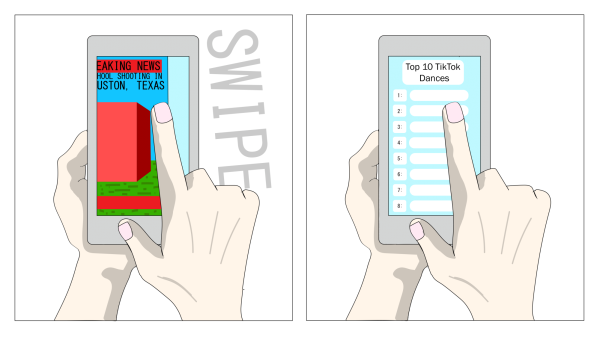Not to be taken lightly

photo by Emily Patterson
Comments like “You need to eat” and “You look so skinny” are common forms of skinny shaming. It is important to realize that they are not compliments and can be hurtful to a thin person.
You arrive at a big family reunion. It has been years since you have seen your aunts and uncles, and you have looked forward to catching up. As you walk in the door, you are greeted with a hug and a long look up and down. Of course, the dreaded comment follows.
“Are you okay? You look like a skeleton!”
Immediately, you become self-conscious, and your excitement fades.
Often causing body dysmorphia and self-deprecation, skinny shaming is a problem in a “loving” and “accepting” society’s rear-view mirror. Thin people tend to get the short end of the body positivity stick, being insulted and told that they should be grateful for their figure, no matter how they view themselves.
“During quarantine, my family would constantly point out how skinny I am and insist that I eat more,” senior Victoria Galindo-Orjuela said. “The comments had an opposite effect and I started to eat less.”
Backhanded compliments such as “You look like a stick” and “You’re the size of my pinky” are common forms of skinny shaming, and many people do not understand why they are harmful. According to a 2017 study by Carleton University, women with a higher BMI failed to see the implications of skinny shaming, only acknowledging the benefits of being thin.
No normal person is going to love their body 100% of the time. Creating a false narrative that being skinny automatically leads to happiness is extremely harmful, and can make skinny people question if their feelings are valid.
“My family members will grab my wrists, thighs, or hip bones and make comments about how I’m ‘too skinny,’” Catherine* said. “It creates problems and is very hurtful.”
But the problem with backhanded compliments goes beyond personal feelings. It seems easy to comment on someone’s small body while everyone agrees that commenting on a bigger body is a moral wrong. The same Carleton study found that women partake in skinny shaming twice as often as they do fat shaming. You would never hear someone say “Put down the cookie, fatty,” without consequence, but “You need to eat a cookie” is considered okay.
The discussion needs to be all-inclusive: whether you are fat, skinny, curvy or rectangular, self-love is a priority. Shaming someone for their body type should not happen, regardless.
“Neither [form of shaming] is acceptable, and they’re both equally harmful,” Galindo-Orjuela said. “Size doesn’t matter, as long as you’re healthy.”
Though skinny shaming is often associated with women, men deal with similar problems. The “protector” stereotype entails men being emotionally void and physically big with muscles and a six pack. Going to the gym often is not enough, and specific eating habits are necessary to grow. Fitting the stereotype is not realistic for some, like Justin*, who has a chronic illness that makes eating difficult.
“I’m skinny shamed practically all day, every day,” Justin, who gets called small and boney, said. “When people make comments, it’s like, ‘I get it, dude. I’m skinny. Big deal.’”
Some people skinny shame because they, too, suffer with body image problems. As hard as it is to deal with insecurities, shaming creates conflicts and will make the pain worse. Bringing others down only provides temporary relief to a broken ego, and makes society more cruel than it already is. The decades-old saying holds true: if you do not have anything nice to say, then do not say anything. Rather, focus on personal confidence and letting go of any bitter feelings. Nobody deserves to hear negative things about their body.
“Skinny shaming feels very intrusive,” Galindo-Orjuela said. “Why make those comments? It’s awkward at best and rude at worst.”
If you are concerned about someone’s eating habits or physical well-being, there are better ways to confront them than to comment on their body. Instead of saying things like “Have you been eating? You look so skinny,” simply ask the person how they have been feeling lately and if they have been taking good care of themselves. This gives them an opportunity to explain what is happening in their life and leaves no room for assumptions about their body. Making someone feel uncomfortable in their own skin will only make their mental and physical state worse.
“When people ask me if I eat, what do they expect me to say? No?” Justin said. “Minding your business will make people feel better about their weight.”
If you are struggling with skinny shaming, bullying or self-esteem issues, there are resources that can help. To speak to a professional, you can call the National Institute of Mental Health at 1-888-ANXIETY, or visit www.stompoutbullying.org.
*Names changed for privacy
Your donation will support the student journalists of Hagerty High School. We are an ad-free publication, and your contribution helps us publish six issues of the BluePrint and cover our annual website hosting costs. Thank you so much!












